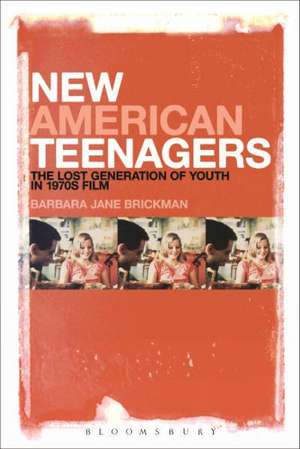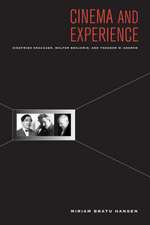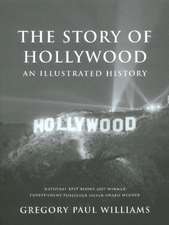New American Teenagers: The Lost Generation of Youth in 1970s Film
Autor PhD Barbara Jane Brickmanen Limba Engleză Paperback – 21 mai 2014
| Toate formatele și edițiile | Preț | Express |
|---|---|---|
| Paperback (1) | 340.45 lei 6-8 săpt. | |
| Bloomsbury Publishing – 21 mai 2014 | 340.45 lei 6-8 săpt. | |
| Hardback (1) | 891.36 lei 6-8 săpt. | |
| Bloomsbury Publishing – 2 mai 2012 | 891.36 lei 6-8 săpt. |
Preț: 340.45 lei
Nou
Puncte Express: 511
Preț estimativ în valută:
65.14€ • 68.20$ • 53.90£
65.14€ • 68.20$ • 53.90£
Carte tipărită la comandă
Livrare economică 05-19 aprilie
Preluare comenzi: 021 569.72.76
Specificații
ISBN-13: 9781628922783
ISBN-10: 1628922788
Pagini: 280
Ilustrații: 10 bw illus
Dimensiuni: 152 x 229 x 20 mm
Greutate: 0.43 kg
Editura: Bloomsbury Publishing
Colecția Bloomsbury Academic
Locul publicării:New York, United States
ISBN-10: 1628922788
Pagini: 280
Ilustrații: 10 bw illus
Dimensiuni: 152 x 229 x 20 mm
Greutate: 0.43 kg
Editura: Bloomsbury Publishing
Colecția Bloomsbury Academic
Locul publicării:New York, United States
Caracteristici
Examines
an
under-studied
set
of
films
as
a
socially
relevant
group
of
teen
narratives
Notă biografică
Barbara
Jane
Brickmanis
an
Assistant
Professor
of
Media
and
Gender
Studies
at
the
University
of
Alabama,
U.S.A.
She
recently
was
an
Associate
Professor
of
English
and
Film
Studies
at
the
University
of
West
Georgia,
where
she
developed
their
Film
Studies
program.
She
has
previously
published
articles
on
the
pathologization
of
female
teens,
fantasy
and
the
teen
spectator,
and
the
queering
of
fandom.
Her
current
project
focuses
on
the
depiction
of
adolescents
in
the
films
of
the
1970s.
Cuprins
Introduction:
New
American
TeenagersChapter
One:
Darktown
Strutters
in
Transsexual
Transylvania:
The
Exploitation
and
Parody
of
"Teenpics"
in
the
1970sChapter
Two:
Coming
of
Age
in
the
1970s:
Revision,
Fantasy,
and
Rage
in
the
Teen-GirlBadlandsChapter
Three:
The
Queer
Kid
and
Women's
LibChapter
Four:
Bad
News
Jodie,
or
How
the
Disney
Family
Got
FreakyChapter
Five:
Brothers,
Sisters,
and
Chainsaws:
The
Slasher
Film
as
Locus
for
Sibling
RivalryConclusion:
The
Legacy
of
the
New
American
Teenagers,
or
Beware
of
Ferris
Recenzii
Barbara
Jane
Brickman's
smart
and
engaging
reading
of
youth-oriented
films
of
the
1970s
charters
new
territory
by
uncovering
their
subversive
potential
in
their
treatment
of
issues
of
gender,
generation,
and
sexuality.
Her
informative
and
insightful
analysis
of
some
of
the
decade's
most
popular
films
is
a
welcomed
addition
to
the
study
of
the
American
teen
film.
New American Teenagersis an invigorating read that will please media scholars and youth scholars alike. Barbara Brickman actively and purposefully rescues for us the teen films and teen viewers of the 1970s, exploring this era of cinema through a blend of intriguing psychoanalytical, feminist, and queer film theories in a manner that provokes reconsideration of key texts.
Through a series of thorough and sometimes humorous analyses of teen film trends in the '70s, Brickman highlights the contributions of the genre to broader developments such as feminism, gay rights, educational reform, and the political power of youth.
Brickman extends the knowledge of teen films while focusing on alternative depictions of teenagers and teen films, such as the "queer kid", dangerous or independent females and insular peer culture that can be unsafe and violent, while focusing less on parental influences.
New American Teenagersis an invigorating read that will please media scholars and youth scholars alike. Barbara Brickman actively and purposefully rescues for us the teen films and teen viewers of the 1970s, exploring this era of cinema through a blend of intriguing psychoanalytical, feminist, and queer film theories in a manner that provokes reconsideration of key texts.
Through a series of thorough and sometimes humorous analyses of teen film trends in the '70s, Brickman highlights the contributions of the genre to broader developments such as feminism, gay rights, educational reform, and the political power of youth.
Brickman extends the knowledge of teen films while focusing on alternative depictions of teenagers and teen films, such as the "queer kid", dangerous or independent females and insular peer culture that can be unsafe and violent, while focusing less on parental influences.








